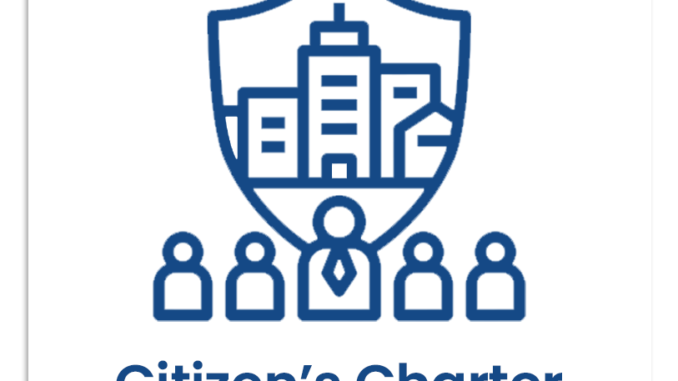
Table of Contents
What is Citizen’s Charter?
- A citizen’s charter is a document of commitments made by a government agency to a citizen in respect of the services being provided to them (citizens)
- Citizen’s charter is a written agreement between the service delivery agencies and citizens regarding the services.
- Citizen’s charter is an expression of understanding between citizens and public service provider.
- Citizen’s charter empowers the citizens to demand the committed standards of services
- Citizen’s charter is expected to indicate WHERE TO GO and HOW TO PROCEED.
- It is a document which represents a systematic effort to focus on the commitment of the organization towards its Citizens.
- Citizen’s charter was first introduced by United Kingdom (UK) and then later adopted by different countries.
Objectives of Citizen’s Charter
- To empower citizens in relation to the public service delivery.
- To build relationship or eliminate gap between citizens and administration or public officers.
- To ensure responsive and citizen friendly governance.
Principles of Citizen’s Charter
Citizen’s charter pioneered by UK government in 1991 has following principles:
- Quality: Improving the quality of services
- Choice: For the users wherever possible
- Standards: Specify what to expect and how to act if standards are not met
- Value: For the tax payers money
- Accountability: Of the service providers
- Transparency: Rules/procedures/grievances/schemes
Basic Components of a Citizen Charter
- Services provided
- Required documents to receive the service
- Tentative time required
- Fee/money required
- Responsible official
- Grievance handler
- Remarks
Detailed Components of a Citizen Charter
1. Introduction of the organization
2. Vision: Ultimate direction in which the organization seek to move
3. Mission: In tune with the vision
4. Location
5. Identification of services: Services provided should be clearly mentioned
6. Identification of levels of services
7. Specification of time limit for each service
8. Specification of time frame at each level
9. Specification of service quality standards
10. Clear information of the procedure to access services
11. Clear information about contact points to obtain service benefits
12. Clear information about information facilitation counters
13. Clear information about public grievance cell
14. Information about online charter
15. Information about right to information
Advantages/Benefits of Citizen Charter
- Citizen’s charter enhances accountability of the public service providers.
- Citizens can avail services on a time bound manner.
- Ensures professional and responsive environment
- Can seek compensation for undue delay of delivery. For example; people are compensated if the trains are delayed in Europe
- Increases organization performance and effectiveness by making a public commitment
- Creates a more professional and client-responsive environment for service delivery
- Decreases the opportunity for corruption
Challenges of Citizen Charter
- Lack of adequate training and sensitization of the workforce
- Citizen’s charter are developed without adequate consultation with the citizens/public.
- Lack of adequate awareness campaigns to educate the clients about the charter.
- Delay in timely/regular revision of the charter
- Lack of familiarity among the service providers regarding philosophy, goals and major features of the charter.
- One size doesn’t fit for all and is vague in many of cases.
- Standards of services mentioned in the charter are sometimes too negligent or too tight or impractical.
- Service delivery standards are poorly defined
- Difficult to provide compensation to the service seekers
- Lack of adequate fund for conducting advocacy and awareness campaigns regarding the importance of citizen charter.
Ways to Strengthen Citizen Charter:
- Engage/consult citizens while developing the citizen charter, its standards, and complaint system
- Ensure adequate publicity and mass media campaigns regarding citizen charter
- Encourage citizens to use the citizen charter effectively for seeking public services.
- Educate/aware the citizens regarding the duties and obligations of both citizens and service providers for seeking services.
- Motivate/encourage staffs to work as per the goals and objectives of the charter
- Develop database for handling public grievances and complaints.
- Promote digitalization of the citizen charter
- Allocating adequate budget for awareness generation activities.
- Strengthen reward and punishment system in public service delivery
- Periodic valuation of the citizen charter
References and For More Information
https://darpg.gov.in/citizens-charters-historical-background
https://darpg.gov.in/citizens-charters-historical-background
http://minorityaffairs.gov.in/sites/default/files/Citizens%20Charters.pdf
https://goicharters.nic.in/public/website/home